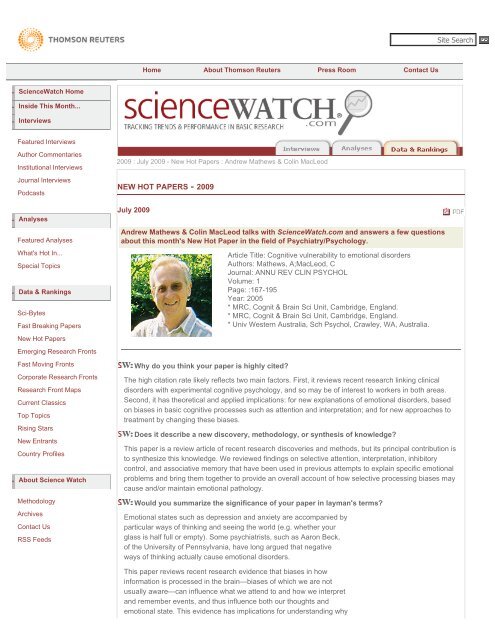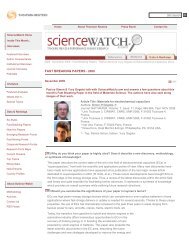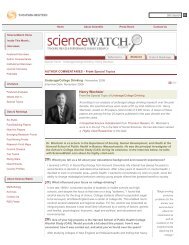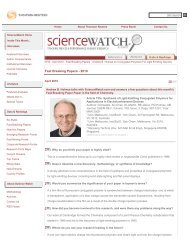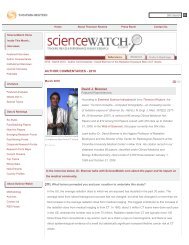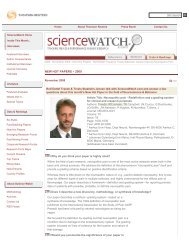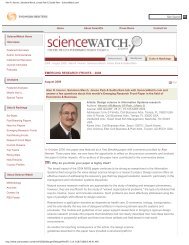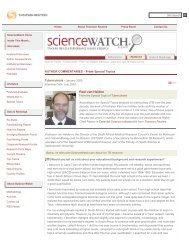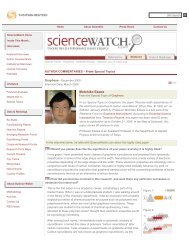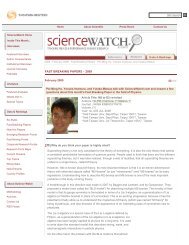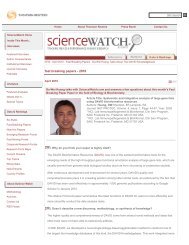Andrew Mathews & Colin MacLeod - ScienceWatch.com
Andrew Mathews & Colin MacLeod - ScienceWatch.com
Andrew Mathews & Colin MacLeod - ScienceWatch.com
You also want an ePaper? Increase the reach of your titles
YUMPU automatically turns print PDFs into web optimized ePapers that Google loves.
Home About Thomson Reuters Press Room Contact Us<br />
●<br />
●<br />
●<br />
<strong>ScienceWatch</strong> Home<br />
Inside This Month...<br />
Interviews<br />
Featured Interviews<br />
Author Commentaries<br />
Institutional Interviews<br />
Journal Interviews<br />
Podcasts<br />
2009 : July 2009 - New Hot Papers : <strong>Andrew</strong> <strong>Mathews</strong> & <strong>Colin</strong> <strong>MacLeod</strong><br />
NEW HOT PAPERS - 2009<br />
●<br />
●<br />
●<br />
Analyses<br />
Featured Analyses<br />
What's Hot In...<br />
Special Topics<br />
Data & Rankings<br />
Sci-Bytes<br />
Fast Breaking Papers<br />
New Hot Papers<br />
Emerging Research Fronts<br />
Fast Moving Fronts<br />
Corporate Research Fronts<br />
Research Front Maps<br />
Current Classics<br />
Top Topics<br />
Rising Stars<br />
New Entrants<br />
Country Profiles<br />
About Science Watch<br />
Methodology<br />
Archives<br />
Contact Us<br />
RSS Feeds<br />
July 2009<br />
<strong>Andrew</strong> <strong>Mathews</strong> & <strong>Colin</strong> <strong>MacLeod</strong> talks with <strong>ScienceWatch</strong>.<strong>com</strong> and answers a few questions<br />
about this month's New Hot Paper in the field of Psychiatry/Psychology.<br />
Why do you think your paper is highly cited?<br />
Article Title: Cognitive vulnerability to emotional disorders<br />
Authors: <strong>Mathews</strong>, A;<strong>MacLeod</strong>, C<br />
Journal: ANNU REV CLIN PSYCHOL<br />
Volume: 1<br />
Page: :167-195<br />
Year: 2005<br />
* MRC, Cognit & Brain Sci Unit, Cambridge, England.<br />
* MRC, Cognit & Brain Sci Unit, Cambridge, England.<br />
* Univ Western Australia, Sch Psychol, Crawley, WA, Australia.<br />
The high citation rate likely reflects two main factors. First, it reviews recent research linking clinical<br />
disorders with experimental cognitive psychology, and so may be of interest to workers in both areas.<br />
Second, it has theoretical and applied implications: for new explanations of emotional disorders, based<br />
on biases in basic cognitive processes such as attention and interpretation; and for new approaches to<br />
treatment by changing these biases.<br />
Does it describe a new discovery, methodology, or synthesis of knowledge?<br />
This paper is a review article of recent research discoveries and methods, but its principal contribution is<br />
to synthesize this knowledge. We reviewed findings on selective attention, interpretation, inhibitory<br />
control, and associative memory that have been used in previous attempts to explain specific emotional<br />
problems and bring them together to provide an overall account of how selective processing biases may<br />
cause and/or maintain emotional pathology.<br />
Would you summarize the significance of your paper in layman's terms?<br />
Emotional states such as depression and anxiety are ac<strong>com</strong>panied by<br />
particular ways of thinking and seeing the world (e.g. whether your<br />
glass is half full or empty). Some psychiatrists, such as Aaron Beck,<br />
of the University of Pennsylvania, have long argued that negative<br />
ways of thinking actually cause emotional disorders.<br />
This paper reviews recent research evidence that biases in how<br />
information is processed in the brain—biases of which we are not<br />
usually aware—can influence what we attend to and how we interpret<br />
and remember events, and thus influence both our thoughts and<br />
emotional state. This evidence has implications for understanding why
emotional problems persist despite being unwanted, and for helping<br />
to improve them by retraining these underlying biases in a more<br />
positive direction.<br />
How did you be<strong>com</strong>e involved in this research, and were<br />
there any problems along the way?<br />
We have been close collaborators for 25 years, during which the<br />
information-processing approach to emotional pathology has<br />
developed from a relatively obscure area of specialist interest, to<br />
be<strong>com</strong>e a major research focus for clinical and cognitive<br />
psychologists alike.<br />
<strong>Andrew</strong> <strong>Mathews</strong> trained in clinical psychology before moving to more<br />
basic research on cognitive aspects of anxiety and depression. <strong>Colin</strong><br />
Coauthor<br />
<strong>MacLeod</strong> began as a cognitive researcher, before be<strong>com</strong>ing<br />
<strong>Colin</strong> <strong>MacLeod</strong><br />
interested in clinical problems and cognitive aspects of emotion. We<br />
first came to work together when <strong>Mathews</strong> recruited <strong>MacLeod</strong> to a<br />
research position in 1983. Despite our subsequent independent relocation to different continents, we<br />
have continued our collaboration.<br />
Where do you see your research leading in the future?<br />
At present, cognitive therapy for emotional disorders seeks to change dysfunctional thinking patterns by<br />
having people consciously monitor their styles of thinking, and deliberately changing them. Such<br />
approaches have proven therapeutic value but they also have limitations. Not all thoughts are amenable<br />
to deliberate control, and not all individuals are capable of maintaining this control, especially when under<br />
stress.<br />
An exciting aspect of our present work is the development of indirect cognitive bias modification<br />
methods, designed to change styles of information processing through extensive practice in simple tasks<br />
designed to encourage automatic selection of more positive meanings. Using these methods will allow<br />
investigation of many important questions about the underlying mechanisms of emotional disorders, and<br />
the integration of cognitive bias modification procedures into clinical practice.<br />
Do you foresee any social or political implications for your research?<br />
Every year, around 12% of the population suffers from clinical depression or anxiety. In addition to the<br />
distress they cause to individuals and their families, these emotional disorders also incur significantly<br />
direct and indirect economic costs, which exceed $65 billion per annum in the US alone. Our research,<br />
together with the other work reviewed in this paper, is intended to increase understanding of the causes<br />
of such disorders, and to enhance their prevention and remediation, with attendant benefits to all<br />
members of society.<br />
<strong>Andrew</strong> <strong>Mathews</strong><br />
Professor<br />
Department of Psychology<br />
University of California<br />
Davis, CA, USA<br />
And<br />
Visiting Professor<br />
Institute of Psychiatry<br />
King's College<br />
University of London<br />
London, UK<br />
Web | Web<br />
<strong>Colin</strong> <strong>MacLeod</strong>, BSc., MPhil., DPhil.<br />
Professor of Psychology<br />
School of Psychology<br />
University of Western Australia<br />
Crawley, WA Australia<br />
Web | Web<br />
KEYWORDS: POSTTRAUMATIC-STRESS-DISORDER; GENERALIZED ANXIETY DISORDER; IMPLICIT<br />
ASSOCIATION TEST; OVERGENERAL AUTOBIOGRAPHICAL MEMORY; THREATENING FACIAL
EXPRESSIONS; SELF-FOCUSED ATTENTION; SOCIAL PHOBIA; PANIC DISORDER; SELECTIVE ATTENTION;<br />
THOUGHT SUPPRESSION.<br />
back to top<br />
2009 : July 2009 - New Hot Papers : <strong>Andrew</strong> <strong>Mathews</strong> & <strong>Colin</strong> <strong>MacLeod</strong><br />
Science Home | About Thomson Reuters | Site Search<br />
Copyright | Terms of Use | Privacy Policy


